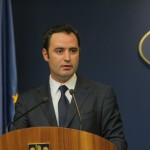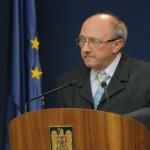High stakes for key ministries in Romania this year

 Several projects will test the strength of the new Government in Romania this year, when officials will need to secure more funding to keep afloat, create more jobs and tackle the social distress in the country. The new government aims to increase salaries and pensions, reduce taxation, create more jobs in healthcare, increase the absorption of EU funding to some EUR 6 billion and open 100 kilometers of highways. Achieving all these aims would be a tall order in any country and whatever the economic conditions, and several key ministries will have to take care of crucial projects for Romania. Romania-Insider.com looks at these projects and the proposed ministers that will oversee them.
Several projects will test the strength of the new Government in Romania this year, when officials will need to secure more funding to keep afloat, create more jobs and tackle the social distress in the country. The new government aims to increase salaries and pensions, reduce taxation, create more jobs in healthcare, increase the absorption of EU funding to some EUR 6 billion and open 100 kilometers of highways. Achieving all these aims would be a tall order in any country and whatever the economic conditions, and several key ministries will have to take care of crucial projects for Romania. Romania-Insider.com looks at these projects and the proposed ministers that will oversee them.
 Finance Ministry – Bogdan Dragoi, 33, former State Secretary in the same ministry. Dragoi has been involved in most of the country's bond issuances in recent years and in the deals with the International Monetary Fund.
Finance Ministry – Bogdan Dragoi, 33, former State Secretary in the same ministry. Dragoi has been involved in most of the country's bond issuances in recent years and in the deals with the International Monetary Fund.
The Finance Ministry is in charge of securing more financing to cover the country's debt and its budget deficit, either through bond issuances or through increasing revenues to the state budget. The Ministry controls the country's Taxation Agency
 Economy Ministry - Lucian Bode, 38 years old, head of the Democrat Liberal Party (PDL) Salaj, president of the Friendship group Romania – Qatar and former president of electricity distribution company Electrica Zalau until 2008.
Economy Ministry - Lucian Bode, 38 years old, head of the Democrat Liberal Party (PDL) Salaj, president of the Friendship group Romania – Qatar and former president of electricity distribution company Electrica Zalau until 2008.
Private CEOs for state companies - As agreed with the International Monetary Fund (IMF), several state companies will have private management. Hidroelectrica, Oltchim, Electrica Furnizare and Compania Nationala Romarm are the first state companies up for private management. The process is ongoing with international executive recruitment companies Spencer Stuart and Egon Zehnder having submitted offers at the end of January.
Planned privatizations- Several planned Initial Public Offerings (IPO) and secondary stock exchange listings are planned for 2012 on the Bucharest Stock Exchange. These could revive the market and attract more foreign investors to the local stock market.
Romgaz, Transgaz and Transelectrica, all in the Economy Ministry's portfolio should be privatized through IPOs this year. Romgaz’ listing will be the most important event of the year, analysts predict, “with the 15 percent stake to be sold worth over EUR 300 million, making this IPO the largest launched so far on the Bucharest Stock Exchange (BSE),” according to a recent Erste report.
Romania must privatize chemical producer Oltchim to satisfy the demands of the International Monetary Fund. In December last year, Romania’s Ministry of Economy signed a contract with PricewaterhouseCoopers (PwC) for consultancy services in preparation and implementation of Oltchim’s privatization. More here. The main shareholder in Oltchim is the Romanian state, with 54.8 percent of shares, while investment fund PCC owns a 17.5 percent stake. PCC previously stated interest in becoming majority shareholder in Oltchim.
Communication Ministry – Razvan Mustea, 32, an MP representing Vrancea county since 2008.
 The big stake for Romania this year will be the sale of its mobile telephony frequencies, as contracts with existing mobile phone operators expire. The Romanian National Authority for Management and Regulation in Communications (ANCOM) announced in November 2011 that they will organize a bid to sell the entire frequency spectrum for the 900 MHz and 1,800 MHz bands, which now partially belong to telecom operators Orange, Vodafone and Cosmote, as their licenses were to expire at the end of 2011 and in 2012 - in the case of Cosmote.
The big stake for Romania this year will be the sale of its mobile telephony frequencies, as contracts with existing mobile phone operators expire. The Romanian National Authority for Management and Regulation in Communications (ANCOM) announced in November 2011 that they will organize a bid to sell the entire frequency spectrum for the 900 MHz and 1,800 MHz bands, which now partially belong to telecom operators Orange, Vodafone and Cosmote, as their licenses were to expire at the end of 2011 and in 2012 - in the case of Cosmote.
Romtelecom, a company where the state still owns 46 percent, is supposed to be listed on the stock exchange as well, according to previous plans
 Administration and Interior Ministry - Gabriel Berca, 43, an MP representing Bacau in the Romanian Parliament and former head of the Government's General Secretary.
Administration and Interior Ministry - Gabriel Berca, 43, an MP representing Bacau in the Romanian Parliament and former head of the Government's General Secretary.
This ministry will have to deal with organizing the elections this year- both local and parliamentary elections are scheduled for 2012 in Romania Additionally, a territorial reorganization could be on the cards this year in Romania, after a democratic Liberal Party (PDL) project was delayed in 2011.
 Transport Ministry – Alexandru Nazare, 31, former state secretary in the Transport Ministry
Transport Ministry – Alexandru Nazare, 31, former state secretary in the Transport Ministry
Romania's weak point – its infrastructure – will be Nazare's territory should the Parliament vote for the new Government. Romania aims to open several new highways this year, as well as start work on new metro lines in the capital city. Hardly among the champions for highway openings in the Central and Eastern European region, Romania hopes to inaugurate two highways this year, with a one – year delay: the Bucharest – Ploiesti and Bucharest – Constanta highways. A new segment of the Transylvania highway should also be completed this year: a 64-km portion connecting Suplacu de Barcau and Bors. Constanta and Arad cities should also get new bypasses.
In 2011, Romania opened 53 kilometers of new highway. The country’s Transport Ministry is currently working on over 400 km of highways.
State airline privatization- Tarom, Romania’s state-owned airline set up in 1954, posted losses in previous years under state management, which is why the country pledged to privatize it through a listing on the Bucharest Stock Exchange. The Romanian Government approved in August last year the privatization strategy for the National Society of Romanian Air Transport “Tarom SA”. The privatization will involve selling a 20 percent stake in the company’s share capital in accordance with commitments made to international financial institutions.
 Health Ministry – Ritli Ladislau, 63, former Health Ministry and head of the Health Insurance House.
Health Ministry – Ritli Ladislau, 63, former Health Ministry and head of the Health Insurance House.
At the helm of one of the key ministries in Romania, where the state healthcare system faces increasing competition from private operators, Ritli Ladislau will have a tough job, as the Romanian government is trying to push through new legislation that will create a shift in the country’s healthcare provision. Now under public debate, the legislation has already caused public controversy. It also triggered the resignation in protest of Raed Arafat as Under Secretary of State in Romania’s Health Ministry, after he openly condemned the draft law’s changes on emergency medical care. Many of the street protesters in Romania over the last weeks complained health care reforms.
editor@romania-insider.com












